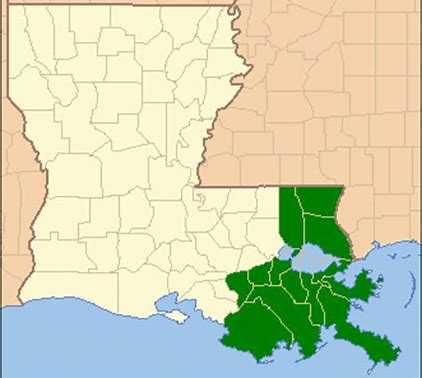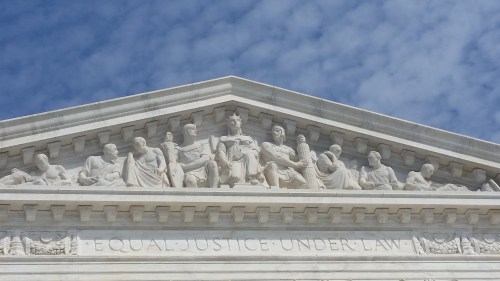
Greg Gerard Guidry (R) has been a Louisiana state court judge since 2000.[1] He has served on the state’s 24th Judicial District Court, Fifth Circuit Court of Appeal (state), and as an Associate Justice on the Louisiana Supreme Court, which position he has held since since 2009.[2] In January of 2019, the White House nominated Guidry to a seat on the United States District Court for the Eastern District of Louisiana.[3]
Background
Guidry, 58, is married with two children and currently lives near Covington, Louisiana.[4] He has been “riding and showing Western performance horses since [he] was nine years old,” and has “three horses, two dogs, three cats, four chickens and about 30 cows on a farm in St. Tammany Parish.”[5] He grew up in Marrero, Louisiana, where he attended public schools through high school.[6] According to a 2015 interview with Guidry, he knew he wanted to be a lawyer in high school and “really never strayed from that goal.” Although he “did not have a specific idea of exactly what [he] wanted to do as a lawyer,” he “could see that lawyers played an integral role in public life, and [he] wanted to be a part of that,” which made it “an easy decision.”[7]
Guidry received a bachelor’s degree from Louisiana State University (LSU) in political science and classical civilizations and a Juris Doctor from LSU’s law school (1985).[8] In law school, he was inducted into the Order of the Coif and “selected for the Louisiana Law Review on the basis of grades.”[9] Guidry was also awarded a “Rotary Foundation Scholarship for International Understanding,” during which he studied classical civilizations and Roman law at the University of the Witwatersrand in Johannesburg, Republic of South Africa.[10]
After his scholarship year, Guidry began working at the oil and energy firm Liskow & Lewis in New Orleans in its commercial litigation division.[11] He switched to the public sector in 1990, when he began a nearly ten-year stint as an Assistant United States Attorney for the Eastern District of Louisiana. As a federal prosecutor, Guidry’s work focused mainly on public corruption and commercial fraud,[12] and he also served as a supervisor, ethics officer and grand jury coordinator.[13] Guidry’s Louisiana Supreme Court bio (and other sources that have republished this bio) states that Guidry “received commendations for his work from the United States Attorney General and the Director of the Federal Bureau of Investigations.”[14]
Guidry was a district court judge on the Twenty-Fourth Judicial District Court for the Parish of Jefferson from 2000-06 and a circuit court judge (Louisiana Fifth Circuit Court of Appeal) from 2006-09. In 2009, he won an election for a position as an Associate Justice on the state’s highest court.[15] The New Orleans Advocate noted that “Guidry’s election…represented part of an ideological and partisan shift on the state Supreme Court. He replaced retiring Justice Pascal Calogero, a New Orleans Democrat who had served as the court’s chief justice.”[16] In 2010, Guidry received a master’s degree in judicial studies from the National Judicial College.[17] He has also served as a legal advisor and trial advocacy instructor to the Republic of South Africa and the United States Virgin Islands, and has “helped to train judges and prosecutors in the African nation of Malawi as they come to grips with complex financial fraud and corruption cases.”[18] He has been a member of the Federalist Society since 2000 and has stated publicly that he intends to remain a member if confirmed.[19]
History of the Seat
President Trump nominated Guidry for the seat in January of 2019. Both of Louisiana’s U.S. senators, Bill Cassidy (R) and John Kennedy (R) have praised the nomination.[20] The seat was left open by Judge Kurt Engelhardt, who has been promoted to a position on the U.S. Fifth Circuit Court of Appeals.[21] Guidry’s confirmation would fill the last open seat on the bench at the Eastern District of Louisiana.[22]
Legal Career
Guidry has spent most of his pre-bench career as a federal prosecutor. In his testimony before the Senate Judiciary Committee, Guidry spoke about this position, noting, “It was the treat of a lifetime to walk into a courtroom and say on a regular basis, ‘I’m here today to represent the United States of America.’”[23] Searchable cases from Guidry’s legal practice are few and far between.[24] A LexisNexis search reveals one published case, a criminal defendant’s appeal from his conviction (U.S. v. Howard, 991 F. 2d 195 (5th Cir. 1993) (affirming conviction; appellant not entitled to a lesser included offense instruction because the indictment was narrowly drawn)), and one unpublished case. U.S. v. Cureaux, 1998 U.S. Dist. LEXIS 14210 (E.D.La. 1998) (denying defendant’s motion for release on bail pending appeal).
In Guidry’s legal career, he has occasionally faced allegations of legal and ethical improprieties. For example, in early 2000, while running for a judgeship, Guidry was accused by his opponent of violating the Hatch Act, which regulates federal employees’ political activities. Specifically, he was accused of accepting endorsements for his campaign for state district court judge before formally resigning as an Assistant United States Attorney. Guidry denies knowing about the complaint when it was made, being contacted by the DOJ in an investigation into the complaint, and engaging in any unauthorized political activity.[25]
In 2007, while Guidry was on the state appellate court, that court’s chief of central staff, Jerrold Peterson, committed suicide in his office, leaving notes revealing illegal practices by the court. For 13 years the court had been denying pro se prisoners’ writ applications without a three-judge panel reviewing them, as required by law.[26] The court had instead illegally allowed one judge to handle all pro se writ applications from 1994 to 2007.[27] Guidry’s opponent in the 2009 election for a position on the state Supreme Court criticized this practice, to which Guidry responded “I had no hand in it or knowledge of it.”[28]
During his 2008 campaign for the state Supreme Court, Guidry’s opponent in the race also accused him of using official court stationary to solicit campaign funds. Guidry has vehemently denied that this happened, contending that the stationary “was designed, created, printed, and distributed without public funds,” and that “the letter was not a solicitation, but an invitation for volunteers to serve on [his] campaign committee.”[29] The Louisiana Judicial Campaign Oversight Committee found Guidry’s opponent’s claims unsubstantiated.[30]
However, the same committee found that a mailer that Guidry had prepared for part of his 2008 campaign for the state Supreme Court violated the state’s code of judicial conduct, which prohibits judges and judicial candidates from “knowingly make or cause to be made a false statement concerning the identity, qualifications, present position or other fact concerning the candidate or an opponent.”). Guidry’s objectionable statements pertained to decisions by his opponent for the seat, Judge Jimmy Kuhn, and were “found not to be supported by the facts.”[31] The committee had investigated the statements in response to a complaint about same. In a public statement, Guidry explained the statements in detail, that “[a] media consultant retained by my campaign had created them, and I had relied upon the facts as presented to me,” and that he “specifically and unequivocally took full responsibility for the use of this campaign literature without any delay.”[32] No discipline was ever imposed as a result of the flyers. Guidry stated of this incident: “nothing similar has happened in my career either before or after these mailers. If confirmed, I will maintain the highest standards of ethical conduct and comply with the Code of Conduct for United States Judges.”[33]
Also in 2008, Guidry was the only judicial candidate nationwide that was endorsed by the Family Research Council (FRC), a group criticized as being antichoice and anti-LGBTQ, who has received the designation of hate group by the Southern Poverty Law Center.[34] The FRC’s executive director, David Nammo, has claimed to have had “several conversations with Guidry and that they considered Guidry’s election crucial to the future of the Louisiana court.”[35] Guidry has denied seeking the FRC’s endorsement.[36]
Jurisprudence
Describing his judicial philosophy, Guidry has said, “I believe that every person that comes to court deserves to be treated the same.”[37] Guidry has also noted that cases “involving the death penalty and the termination of parental rights” are “the two categories of cases that are most likely to cause me to lose sleep at night because of their extreme consequences.”[38] Reflecting on changes he has seen in his involvement in the judicial system, Guidry stated that “[t]he cost of accessing our court system has risen to a level which I believe is not acceptable.” Indeed, to the extent that a “first offense misdemeanor charge could lead to a massive financial obligation for someone of meager means[,] [s]ometimes, we are setting people up to fail.”[39]
Guidry has served on the Louisiana Supreme Court since 2009. As such, Guidry was the sole dissenting judge in the Louisiana Supreme Court case Louisiana Federation of Teachers v. State, 118 So.3d 1033 (2013), which struck down Louisiana’s school voucher system as violating the state Constitution. The state Constitution establishes how monies are to be allocated to public schools based on a formula adopted by the state board of education. Then-Governor Bobby Jindal’s 2012 package of education reforms diverted money from each student’s per-pupil allocation to cover the cost of private or parochial school tuition.[40] In Guidry’s view, “the record showed that, once a student leaves a school district, the district is no longer entitled to the state’s share of the [per-pupil allocation] for that student, and thus the district’s state share…is removed from” the district’s overall allocation of funds, thus avoiding any constitutional problem.[41]
Additionally, in Costanza, et al. v. Caldwell, et al. (NO. 2014-CA-2090), which was the state of Louisiana’s appeal from a lower court’s ruling declaring Louisiana’s Defense of Marriage Act unconstitutional, the Louisiana Supreme Court considered the effect of the Supreme Court’s Obergefell decision, which came down while the appeal was pending. The plaintiff-appellees were Louisiana women who got married in California, which had legalized gay marriage, and then sought to enforce their marriage when they returned to Louisiana, where same-sex marriage was still illegal. Additionally, one of the plaintiff-appellees had a biological son, who the other plaintiff-appellee sought to legally adopt after they were married. In light of SCOTUS’s then-recent opinion, the Louisiana Supreme Court issued a per curium opinion denying the appeal as moot, noting that SCOTUS’s “interpretation of the federal constitution is final and binding on this court.”[42] Guidry wrote separately in a concurrence to criticize a dissenting judge. The full text of Guidry’s concurrence:[43]
Judges are bound by oath to follow the law regardless of our personal opinions, and we insist that everyone appearing before us do the same. The dissenting opinion suggests we should not follow the holding of the Supreme Court of the United States. However, it cites no legal authority. It cannot, because there is none to support its position. I am bound by my oath as an elected justice of this state to abide by the rule of law.
I must also respond to the dissenting opinion’s assertion that the “most troubling prospect of same sex marriage is the adoption by same sex partners of a young child of the same sex.” The dissenting opinion appears to be unaware of the facts of the case before us, which involves the intra-family adoption of a boy by the female spouse of the boy’s biological mother. See In re Adoption of N.B., 14-314 (La. App. 3 Cir. 6/11/14), 140 So.3d 1263. In any event, the dissenting opinion cites no legal or scientific authority, nor does the record contain any evidence, that would support its insinuation.
Guidry echoed this sentiment in his answers to written questions from Senator Feinstein in February, 2019.[44] E.g., Answer 2(a) (“if I am confirmed as a district court judge, I will follow Roe v. Wade, which has been Supreme Court precedent for more than 40 years, as well as all other Supreme Court and Fifth Circuit precedent.”)
Speeches/Writings
In 1984, Guidry published a student note that criticized Louisiana’s physician-patient privilege statute and suggested that courts should be allowed to circumvent it in certain circumstances. Greg G. Guidry, Note, The Louisiana Supreme Court and the Physician Patient Privilege: Arsenaux v. Arsenaux, 44 La. L. Rev. 1813 (1984). He analyzed a state supreme court case, Arsenaux v. Arsenaux, in which a husband sought to access his wife’s medical records “in order to use evidence of an alleged abortion against her in divorce proceedings.”[45] The trial court held that the records were privileged, which Guidry criticized as an “inequitable” and “harsh” result. Senator Feinstein asked Guidry about this note earlier this year: “Do you still believe that the judiciary should be given the flexibility to undermine physician-patient privilege, even when it would interfere with a woman’s right to privacy in her reproductive choices?”[46] Guidry responded: “The issue presented in Arsenaux v. Arsenaux was whether the husband, who had undergone a vasectomy, was entitled to the medical records of the wife to prove adultery as a ground for divorce. In my case note for the Louisiana Law Review, I pointed out that the majority of the court felt constrained by the language of the health care provider statute and had correctly adopted a literal interpretation of the statute as enacted by the legislature, rather than judicially create any additional exceptions to the medical records’ privilege. 44 La. L. Rev. at 1819. It was properly within the legislature’s purview to provide any further guidance to the courts to resolve actions in which an essential issue is the existence of a mental or physical condition or ailment.”[47]
Guidry was published in the Louisiana Law Review again in 2010. Greg G. Guidry, The Louisiana Judiciary: In the Wake of Destruction, 70 La. L. Rev. 1145 (2010).[48] His aim was to “offer insight into the intimate details of the state courts’ response when faced with the near collapse of the legal system’s infrastructure,” in the wake of Hurricane Katrina. Id. at 1146. “These post-storm issues include the magnitude of catastrophic destruction, the longterm displacement of the entire New Orleans population, the paralysis of neighboring cities and states with the mandatory evacuation of coastal communities, and the scope of inadequate governmental response.”
Overall Assessment
Guidry is highly qualified for the federal judiciary and, as seen from his concurrence in the Costanza matter, appears to apply the law faithfully, regardless of political orientation. The ethical violations raised against him in the past are unlikely to pose difficulties for his confirmation, as they are either relatively minor or actively contested by Guidry himself. As such, it is likely that most Republicans (who control the Senate) will give Guidry the benefit of the doubt on the matter.
[2] https://www.theadvocate.com/new_orleans/news/politics/article_d0ee4940-74a3-11e8-a796-4baeaf55aaa6.html
[4] https://neworleanscitybusiness.com/blog/2010/05/12/off-the-clock-greg-guidry-louisiana-supreme-court-first-district-justice/; https://www.nola.com/news/2019/01/greg-guidry-louisiana-supreme-court-judge-picked-by-donald-trump-for-federal-court.html
[5] http://files.lsba.org/documents/publications/BarJournal/Feature3-Guidryinterview-Dec15-Jan16.pdf (at 267).
[6]https://www.nola.com/news/2019/01/greg-guidry-louisiana-supreme-court-judge-picked-by-donald-trump-for-federal-court.html; http://files.lsba.org/documents/publications/BarJournal/Feature3-Guidryinterview-Dec15-Jan16.pdf (at 265).
[7]https://www.nola.com/news/2019/01/greg-guidry-louisiana-supreme-court-judge-picked-by-donald-trump-for-federal-court.html; http://files.lsba.org/documents/publications/BarJournal/Feature3-Guidryinterview-Dec15-Jan16.pdf (at 265).
[9]Id.
[10]http://www.lasc.org/justices/guidry.asp. A complete list of Guidry’s honors, recognitions, an employment can be found in his response to the Senate’s Questionnaire for Judicial Nominees, available at https://www.judiciary.senate.gov/imo/media/doc/Greg%20Guidry%20SJQ%20-%20PUBLIC.pdf.
[13] http://files.lsba.org/documents/publications/BarJournal/Feature3-Guidryinterview-Dec15-Jan16.pdf (at 266).
[16]https://www.theadvocate.com/new_orleans/news/politics/article_d0ee4940-74a3-11e8-a796-4baeaf55aaa6.html
[18] http://files.lsba.org/documents/publications/BarJournal/Feature3-Guidryinterview-Dec15-Jan16.pdf (at 267).
[19] https://www.judiciary.senate.gov/imo/media/doc/Guidry%20Responses%20to%20QFRs.pdf (Sen. Feinstein Questions, at 7; Sen. Whitehouse Questions, at 3).
[20]https://www.nola.com/news/2019/01/greg-guidry-louisiana-supreme-court-judge-picked-by-donald-trump-for-federal-court.html
[21] https://www.theadvocate.com/new_orleans/news/politics/article_d0ee4940-74a3-11e8-a796-4baeaf55aaa6.html
[22] https://www.theadvocate.com/new_orleans/news/politics/article_d0ee4940-74a3-11e8-a796-4baeaf55aaa6.html
[24] The author found no cases from Guidry’s time in private practice.
[25]https://www.judiciary.senate.gov/imo/media/doc/Guidry%20Responses%20to%20QFRs.pdf (Sen. Hirono Questions, at 1).
[29] https://www.judiciary.senate.gov/imo/media/doc/Guidry%20Responses%20to%20QFRs.pdf (Sen. Hirono Questions, at 1-2).
[32]https://www.judiciary.senate.gov/imo/media/doc/Guidry%20Responses%20to%20QFRs.pdf (Sen. Feinstein Questions, at 3-4)
[33]https://www.judiciary.senate.gov/imo/media/doc/Guidry%20Responses%20to%20QFRs.pdf (Sen. Hirono Questions, at 2).
[35]https://www.judiciary.senate.gov/imo/media/doc/Guidry%20Responses%20to%20QFRs.pdf (Sen. Blumenthal Questions, at 1).
[36] Id.
[38]http://files.lsba.org/documents/publications/BarJournal/Feature3-Guidryinterview-Dec15-Jan16.pdf (at 266).




